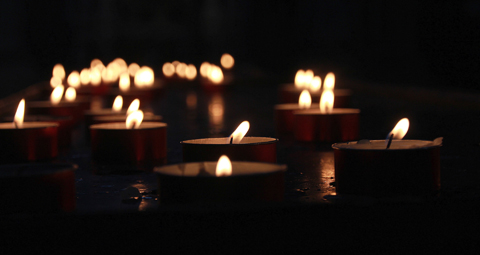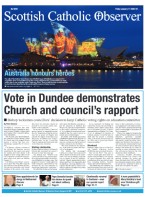BY Peter Diamond | April 12 2019 | ![]() 0 COMMENTS
0 COMMENTS ![]() print
print

Reports of a ‘ban’ on eulogies at funerals are misleading, bishop says
Publication Date: 2019-04-12
Bishop rejects secular characterisation of advisory letter to priests
The Bishop of Motherwell has rejected reports in the media that he has ‘banned’ eulogies from funerals, saying he was simply trying to ensure priests were not ‘hung out to dry’ for celebrating Catholic funerals according to the Funeral Rite.
Bishop Joseph Toal was speaking after multiple newspapers and broadcasters reported on a letter issued to his priests and deacons which had been leaked to the Catholic News Agency on the day it was released.
Secular media outlets accused the bishop of ‘banning eulogies’ from funerals in Motherwell Diocese, but addressing the matter Bishop Toal said: “I had not intended that to be the case—I was merely addressing the appropriate format.”
Several priests have told the SCO they are supportive of the letter, and that explaining the nature of a Catholic funeral to non-practicing mourners is often particularly hard.
Homilies
The letter was released last Wednesday morning. It advises that ‘a priest or deacon celebrating the Funeral should preach a homily and that the homily should not be a eulogy.’
However, it goes on to say that it is ‘appropriate for the preacher to integrate some detail about the deceased’s life into his homily’ and that ‘a few words of tribute could be offered before the Funeral Mass or Service begins.’
Bishop Toal said the letter instructions were his ‘guidelines’ to clergy and that he ‘just wanted to help my priests’ who had been increasingly getting requests to ‘do things in a certain way, which can be difficult.’
He said: “Families can get upset if they are asking a priest to do something which is not custom within the Church and can’t be done. It’s an emotional time for people when someone dies and priests want to do their best.
“I just wanted to help the priests in my diocese as increasingly they were getting questioned on these things.”
Misrepresentation
In January, Paisley Diocese published similar guidelines for ‘families planning Catholic funerals,’ with much of the content similar to what Bishop Toal has outlined for Motherwell Diocese.
The letter has received criticism online after several media reports, but Bishop Toal insisted that he was misrepresented.
“I didn’t see any of the newspapers talk but if they are saying I have banned eulogies then that was not intended to be the case,” he said.
“I would also add that I simply don’t accept people saying that Catholic funerals are no longer personal—it’s absurd.
“There are a significant number of prayers throughout the Mass where the deceased is prayed for particularly relating to the Resurrection.
“I’m not against eulogies, but they can prolong the service for others because more often than not a funeral Mass will take place during 10 o’clock Mass and therefore a priest needs to consider his own parishioners, who may not be comfortable sitting through something which could easily be said before Mass starts, at the graveside, reception of remains, or afterwards at a function.”
Variation
Bishop Toal added: “I’ve had increasing correspondence asking me to address the issue so that is what I’ve done.
“Of course there will be variation amongst the clergy but it’s important that one priest is not hung out to dry for doing something which is correct or incorrect, which is why I wrote the letter.
“All the priests I’ve spoken to have said they welcomed the letter and it’s good to be able to state clearly what should happen at funerals.
“I think having a eulogy before the final commendation can break the flow of the liturgy but that’s my own personal opinion. I just feel it is not a good time to do it.”
The Bishop of Motherwell also stressed that Catholic funerals are positive and beautiful.
“A Catholic funeral is a very uplifting experience and there is a lot of substance to it.
“We want to ensure that we continue to maintain the Liturgical order which has been in the Church for centuries,” he said.
A ‘beautiful atmosphere’
“My letter was direct and perhaps didn’t emphasis enough the positives about Catholic funerals.
“People like Catholic funerals, the prayers of the liturgy and naming and talking about the person in the context of the Resurrection, which creates a beautiful atmosphere and praying for the person’s eternal rest.
“A eulogy is not a homily and a homily is not intended to be a eulogy—they are separate things entirely.
“A homily is to preach the Gospel and at that point the priest may wish to weave into his points recalling snippets of the person’s life, usually gathered from the family in funeral preparations, and most priests take that on and are great at it.”
Stretched thin
With 61 priests serving 74 churches in Motherwell Diocese, demand of priests is outstripping supply, with that number expected to further as years progress.
In 2017 there were 1,858 funerals across the diocese when there were 65 working priests, meaning their time is often spread doing more work with less time.
Bishop Toal was also accused of banning family members from taking part in the liturgy, however he said that the letter simply stressed that people who normally read at Mass may be best suited for the role.
“Reading at funerals can be extremely difficult because of the emotion of the day,” he said.
“If I was to read at my mother’s funeral and I had not been to Church for a long time or never read in public before I would find it very hard.
“The readings are a very important part of the Mass and ideally whoever is reading should have a connection with the Church—people shouldn’t feel obliged.
“But if someone is able to do it then that is also fine and therefore it’s important when choosing someone to do a reading at a funeral that we chose well.”
Assisting deacons
In relation to the issue of reception of remains at a funeral Bishop Toal was quick to remind people that permanent deacons (there are 13 in Motherwell) are able to conduct reception of remains should a family wish it.
“I’m a bit uneasy about priests declining mourners who wish a reception of remains and I have heard of that on a couple of occasions,” he said.
“We have a lot of deacons in our diocese nowadays who can help with that sort of thing but it’s also the case that not every family wants their relative brought into the church the night before the funeral.”










